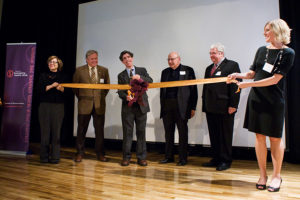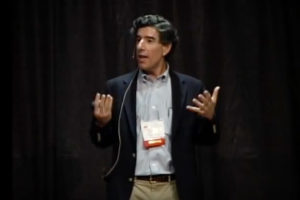Economic growth, consumption, sustainability and happiness will be explored during the sixth annual Nelson Institute Earth Day conference on Monday, April 16, at the Monona Terrace Community and Convention Center in Madison.
Lyonpo Yeshey Zimba, former prime minister of Bhutan, will deliver one of the keynote lectures. Zimba, a UW–Madison alumnus who currently serves as Bhutan’s minister of works and human settlement, will discuss his country’s “gross national happiness” initiative, a measure of quality of life that includes factors such as economic well-being, environmental quality, physical and mental health, and sense of community.
“Bhutan was the first country to adopt a happiness index as a comprehensive measure of social progress,” says Gregg Mitman, interim director of the Nelson Institute for Environmental Studies. “Other countries are considering similar measures of well-being, and the United Nations has recognized happiness as a fundamental human pursuit consistent with the Millennium Development Goals.”
Happiness has also become the subject of intense psychological research, led by scientists such as Richard Davidson, director of the UW–Madison Center for Healthy Minds. Davidson, author of a new book, The Emotional Life of Your Brain, will take part in a panel discussion exploring connections between the economy, environment and personal satisfaction.
Other featured speakers at the Earth Day conference will include Juliet Schor, a Boston College economist and author of Plenitude, The Overworked American and other books; Daniel Oros, a partner with the venture capital firm Kleiner Perkins Caufield and Byers; award-winning novelist Julia Alvarez, author of How the Garcia Girls Lost Their Accents, Saving the World and a new non-fiction book, A Wedding in Haiti; and University of Kansas environmental historian Donald Worster, author of The Wealth of Nature and a book in progress that will revisit the “limits to growth” issue.
The notion of limits to population and economic growth has been debated since at least the late 18th century. Following World War II, President Harry Truman ordered a commission to study the issue, and the 1972 publication of “The Limits to Growth” – a study in which an international team of researchers used computer models to project population, pollution and resource depletion trends – sparked an international debate.
“‘The Limits to Growth’ was criticized for some of its methods and assumptions, but it raised important issues,” says Mitman. “Our goal is to explore how different approaches to economic growth and environmental stewardship intersect with our individual sense of well-being.”
Conference breakout sessions will focus on urban agriculture and food security, property ownership, mindfulness, sustainable development, transportation and other topics. Awards for student innovation in sustainability and climate research will also be presented, and more than 50 exhibits will be on hand.
A related event, a showing of the documentary Happy, will take place on Tuesday, April 17, at 7:15 p.m. at the Wisconsin Institutes for Discovery. A panel discussion will follow featuring filmmaker Roko Belic, psychologist Richard Davidson and “Planetwalker” John Francis.






